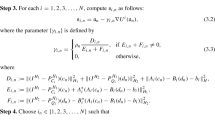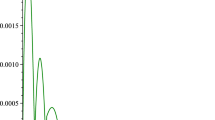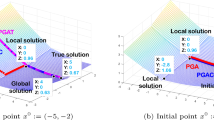Abstract
In this paper, a modified modulus-based matrix splitting iteration method is established for solving a class of implicit complementarity problems. The global convergence conditions are given when the system matrix is a positive definite matrix or an H+-matrix, respectively. In addition, some numerical examples show that the proposed method is efficient.
Similar content being viewed by others
References
Alanelli, M., Hadjidimos, A.: A new iterative criterion for H-matrices. SIAM J. Matrix Anal. Appl. 29, 160–176 (2006)
Bru, R., Giménez, I., Hadjidimos, A.: Is a ∈ c nn a general H-matrix?. Linear Algebra Appl. 436, 364–380 (2012)
Bai, Z.-Z.: The monotone convergence of a class of parallel nonlinear relaxation methods for nonlinear complementarity problems. Comput. Math. Appl. 31, 17–33 (1996)
Bai, Z.-Z.: New comparison theorem for the nonlinear multisplitting relaxation method for the nonlinear complementarity problems. Comput. Math. Appl. 32, 41–48 (1996)
Bai, Z.-Z.: Asynchronous parallel nonlinear multisplitting relaxation methods for the large sparse nonlinear complementarity problems. Appl. Math. Comput. 92, 85–100 (1998)
Bai, Z.-Z.: A class of asynchronous parallel nonlinear accelerated overrelaxation methods for the nonlinear complementarity problem. J. Comput. Appl. Math. 93, 35–44 (1998)
Bai, Z.-Z.: On the convergence of the multisplitting methods for the linear complementarity problem. SIAM J. Matrix Anal. Appl. 21, 67–78 (1999)
Bai, Z.-Z.: Modulus-based matrix splitting iteration methods for linear complementarity problems. Numer. Linear Algebra Appl. 17, 917–933 (2010)
Bai, Z.-Z., Zhang, L.-L.: Modulus-based synchronous multisplitting iteration methods for linear complementarity problems. Numer. Linear Algebra Appl. 20, 425–439 (2013)
Bai, Z.-Z., Zhang, L.-L.: Modulus-based synchronous two-stage multisplitting iteration methods for linear complementarity problems. Numer. Algorithms 62, 59–77 (2013)
Baiocchi, C., Capelo, A.: Variational inequalities and quasi-variational inequalities: Applications to free boundary value problems. Wiley, New York (1984)
Bensoussan, A., Lions, J.-L.: Nouvelle formulation de problèmes de contrôle impulsionnel et applications. C. R. Acad. Sci. Paris, Ser. A-B 276, 1189–1192 (1973)
Berman, A., Plemmons, R. J.: Nonnegative matrix in the mathematical sciences. SIAM Publisher, Philadelphia (1994)
Chan, D., Pang, J.-S.: The generalized quasi-variational problem. Math. Oper. Res. 7, 211–222 (1982)
Cottle, R.W., Giannessi, F., Lions, J.-L.: Variational inequalities and complementarity problems: Theory and applications. Wiley, Chichester (1980)
Cottle, R.W., Pang, J.S., Stone, R.E.: The Linear Complementarity Problem. Academic, San Diego (1992)
Dong, J.-L., Jiang, M.-Q.: A modified modulus method for symmetric positive-definite linear complementarity problems. Numer. Linear Algebra 16, 129–143 (2009)
Frommer, A., Mayer, G.: Convergence of relaxed parallel multisplitting methods. Linear Algebra Appl. 119, 141–152 (1989)
Hadjidimos, A., Tzoumas, M.: Nonstationary extrapolated modulus algorithms for the solution of the linear complementarity problem. Linear Algebra Appl. 431, 197–210 (2009)
Hestenes, M.R., Steifel, E.: Methods of conjugate gradient for solving linear systems. J. Res. Natl. Bur. Stand. 49, 409–436 (1952)
Hong, J.-T., Li, C.-L.: Modulus-based matrix splitting iteration methods for a class of implicit complementarity problems. Numer. Linear Algebra, https://doi.org/10.1002/nla.2044 (2016)
Hu, J.-G.: Estimates of \(||{b^{-1}c}||_{\infty }\) and their applications. Math. Numer. Sin. 4, 272–282 (1982)
Isac, G.: Complementarity problems, lecture notes in mathematics. Springer, New York (1992)
Isac, G.: Leray-schauder type alternatives, complementarity problems and variational inequalities. Springer, Boston (2006)
Li, W.: A general modulus-based matrix splitting method for linear complementarity problems of H-matrices. Appl. Math. Lett. 26, 1159–1164 (2013)
Li, W., Zheng, H.: A preconditioned modulus-based iteration method for solving linear complementarity problems of H-matrices. Linear Multilinear Algebra 64, 1390–1403 (2016)
Liu, S.-M., Zheng, H., Li, W.: A general accelerated modulus-based matrix splitting iteration method for solving linear complementarity problems. Calcolo 53, 189–199 (2016)
Mosco, U.: Implicit variational problems and quasi-variational inequalities, lecture notes in mathematics. Springer, New York (1976)
Mosco, U.: On some nonlinear quasi variational inequalities and implicit complementarity problems in stochastic control theory in variational inequalities and complementarity problems. Wiley, New York (1980)
Murty, K.G.: Linear complementarity, linear and nonlinear programming. Heldermann Verlag, Berlin (1988)
Noor, M.: Mildly nonlinear variational inequalities. Mathematica 24, 99–110 (1982)
Noor, M.: Nonlinear quasi complementarity problems. Appl. Math. Lett. 2(3), 251–254 (1989)
Noor, M.: Linear quasi-complementarity problem. Utilitas Mathematica 27, 249–260 (1985)
Noor, M.: The quasi-complementarity problem. J. Optimiz. Theory Appl. 130, 344–353 (1988)
Noor, M.: Fixed point approach for complementarity problems. J. Optimiz. Theory Appl. 133, 437–448 (1988)
Pang, J.-S.: On the convergence of a basic iterative method for the implicit complementarity problems. J. Optimiz. Theory Appl. 37, 149–162 (1982)
Pang, J.-S.: The implicit complemenarity problem. Academic Press, San Diego (1992)
Saad, Y., Schultz, M.: GMRES: A generalized minimal residual algorithm for solving nonsymmetric linear systems. SIAM J. Sci. Statist. Comput. 7, 856–869 (1986)
van Bokhoven, W.M.G.: Piecewise-linear modelling and analysis. Proefschrift, Eindhoven (1981)
Yuan, Q, Yin, H.-Y.: Stationary point of the minimization reformulations of implicit complementarity problems. Numer. Math. A J. Chinese Universities 31, 11–18 (2009)
Zhan, W.-P., Zhou, S.-Z., Zeng, J.-P.: Iterative methods for a kind of quasi-complementarity problems. Acta. Math. Appl. Sin. 23, 551–556 (2000)
Zhang, L.-L.: Two-step modulus based matrix splitting iteration for linear complementarity problems. Numer. Algorithms 57, 83–99 (2011)
Zhang, L.-L.: Two-stage multisplitting iteration methods using modulus-based matrix splitting as inner iteration for linear complementarity problems. J. Optimiz. Theory Appl. 160, 189–203 (2014)
Zhang, L.-L.: Two-step modulus-based synchronous multisplitting iteration methods for linear complementarity problems. J. Comput. Math. 33, 100–112 (2015)
Zhang, L.-L., Ren, Z.-R.: Improved convergence theorems of modulus-based matrix splitting iteration methods for linear complementarity problems. Appl. Math. Lett. 26, 638–642 (2013)
Zheng, H., Li, W.: The modulus-based nonsmooth Newton’s method for solving linear complementarity problems. J. Comput. Appl. Math. 288, 116–126 (2015)
Zheng, H., Li, W., Vong, S.: A relaxation modulus-based matrix splitting iteration method for solving linear complementarity problems. Numer. Algorithms 74, 137–152 (2017)
Zheng, H., Vong, S.: Improved convergence theorems of the two-step modulus-based matrix splitting and synchronous multisplitting iteration methods for solving linear complementarity problems. Linear Multilinear Algebra https://doi.org/10.1080/03081087.2018.1470602 (2018)
Zheng, N., Yin, J.-F.: Accelerated modulus-based matrix splitting iteration methods for linear complementarity problems. Numer. Algorithms 64, 245–262 (2013)
Acknowledgements
The authors would like to thank the reviewers for their helpful suggestions.
Funding
The work was supported by the National Natural Science Foundation of China (Grant No. 11601340), University of Macau (Grant No. MYRG2017-00098-FST), Macao Science and Technology Development Fund (Grant No. 050/2017/A), the Opening Project of Guangdong Provincial Engineering Technology Research Center for Data Sciences (Grant No. 2016KF11), and Science and Technology Planning Project of Shaoguan (Grant No. SHAOKE [2016]44/15).
Author information
Authors and Affiliations
Corresponding author
Rights and permissions
About this article
Cite this article
Zheng, H., Vong, S. A modified modulus-based matrix splitting iteration method for solving implicit complementarity problems. Numer Algor 82, 573–592 (2019). https://doi.org/10.1007/s11075-018-0614-z
Received:
Accepted:
Published:
Issue Date:
DOI: https://doi.org/10.1007/s11075-018-0614-z




